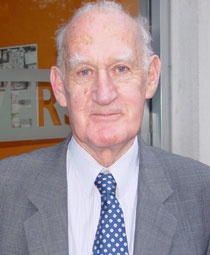Mandela biographer recalls journey to freedom
12/12/04
Mandela biographer recalls journey to freedom
 One of Nelson Mandela’s closest confidants has given an insight into his friendship with the former South African leader during a visit to Kingston University. Anthony Sampson, author of Mandela’s official biography, was at the University to deliver a lecture on contemporary politics and history organised by the Faculty of Arts and Social Sciences.
One of Nelson Mandela’s closest confidants has given an insight into his friendship with the former South African leader during a visit to Kingston University. Anthony Sampson, author of Mandela’s official biography, was at the University to deliver a lecture on contemporary politics and history organised by the Faculty of Arts and Social Sciences.
A former assistant editor at The Observer, Mr Sampson was asked to write Mandela’s official biography almost 50 years after their paths first crossed in Johannesburg. The pair met in 1951 when Mr Sampson was editor of leading black periodical Drum. “I spent a lot of time in the townships and established ties with prominent political figures such as Mandela,†he said. “He was a young revolutionary battling apartheid and I was just starting out as a journalist. Initially I found him difficult to relate to and quite arrogant, but, as I earned his trust, we became great friends.â€
Mr Sampson advised Mandela on the speech he made when he was sentenced to life imprisonment in 1961 for his planned campaign of guerrilla activity against the white regime. “During the trial, I clenched my fist to show my support for Mandela and was removed from the court,†Mr Sampson recalled. “His lawyer approached me outside and said Mandela wanted me to look at the speech he had prepared. He knew he was going to prison for a long time. It was extraordinary to be asked for my opinion on a speech that would go down in political history.â€
In 1990, Mandela was released after 27 years on Robben Island and was inaugurated as the first democratically-elected President of South Africa four years later. His retirement from public life in 1999 coincided with the release of Mr Sampson’s book, Mandela: The Authorised Biography. “It was a privilege to be asked to write the book. I was given full access to Mandela, his personal papers, his friends and political associates,†Mr Sampson said. “When I met him again he was a different person. The earlier arrogance had subsided and he was much more philosophical. In many ways I believe all those years in prison played a pivotal part in his political development.â€
Â